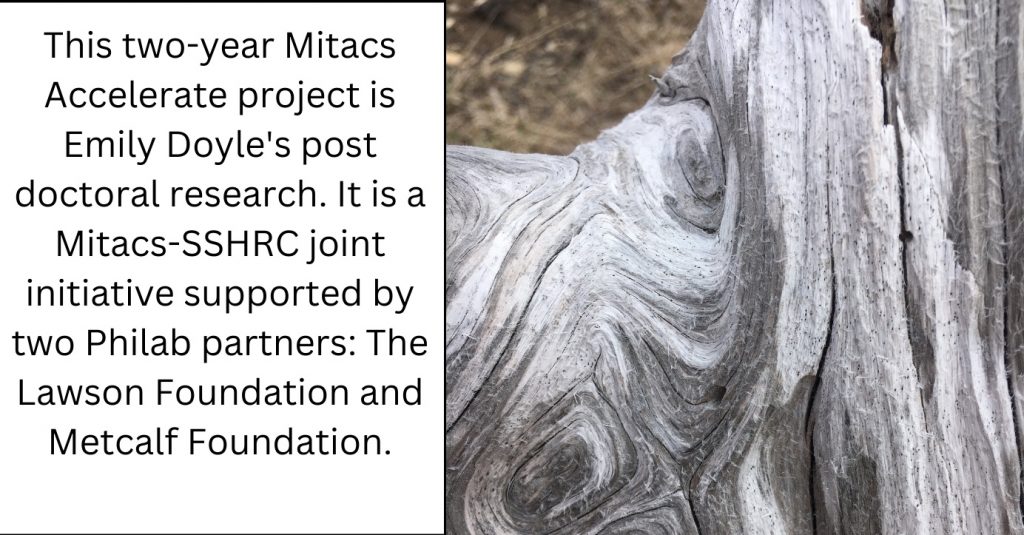
Project Summary by Emily Doyle, PhD
The focus of my two year MITACS post doc project is to deepen understanding of how to build and sustain transdisciplinary partnerships in Atlantic Canada by proposing a two-pronged approach which includes:
1) Build capacity within the Atlantic Canada philanthropic-research landscape by supporting understanding of intersectoral responses to emergent needs of community partners and;
2) Focus directly on the role, strategy and impact of food system organizations in providing a model of innovation for intersectoral systems change.
Since beginning my MITACS project, I have been working to develop connections to and understanding of Indigenous, particularly Mi’kmaw, communities and culture on the west coast of the island of Newfoundland. I am looking specifically at food system actors and transformations to offer a narrative and goal for strategic investments that respond to the triple bottom line of future sustainability efforts. Previous food system research in this country helps demonstrate how actors across scales and sectors including philanthropic actors can come together to bring upon system change. Food systems research as a field has also prioritized an understanding of food sovereignty and Indigenous rights in this country along with an awareness of how the current system is bringing triple threats to our future (environmental, health and social inequality). The learnings from Indigenous led philanthropy connect directly to the critical study of food systems in the shared story of how food was and is harvested and distributed for the community and it is this connection between Indigenous led philanthropy and seeking more equitable food systems that helps to justify why this project focuses on food systems transformation in Atlantic Canada.
In the Spring of 2023, my children and I relocated to Stephenville for two months thanks to the Community Scholar Fund awarded by the Office of Public Engagement. It is my connection to Chief Peggy White of the Three Rivers Mi’kmaq band that helped me to secure this opportunity. I first met Chief Peggy as she connected with Grenfell to seek advice and support for her developing plan of strengthening the food system to achieve health equity for her community. The time spent connecting with Chief Peggy helped me to learn more about the unique needs and assets of the Three Rivers Mi’kmaq band. The process of working together helped me to develop a community based connection that will inform my PhiLab funded research project, which focuses on food systems transitions and how they intersect with philanthropy. This work will be where my research begins and potentially links to questions that national philanthropic foundations are asking with regards to how to resource the food system strategically.
A concurrent community based research connection that I have been working to develop (also in the bay St. George region) since I began my time as a postdoc working with Dr. Vodden has been working with a group in St. George’s connected to Bayview Academy to support that school in transforming the school food system to be more healthy and sustainable. We applied for and received a Farm to Cafeteria grant to support this project and team. In March 2023 we held a strategic planning day at the Bay St. George Community Hub to bring together members of the school community to help plan, support this project and develop a shared understanding of goals and actions. There is crossover between the Bayview Land to Cafeteria project and the process many Indigenous and other communities on the West Coast of the island are undertaking to build a stronger more equitable food production and distribution system.
It is in connection to these unfolding events and relationships in the region that I work to understand from the ground up and to support how people in this region are responding to food system issues. I am currently working on developing a report of what funding channels communities use to support food system actions and also what funding channels are available to communities to support these actions. I seek community approval to continue to conduct my research which would be followed by ethics approval. My research will consist of recording and documenting further conversations and learnings with people in this region about some of the challenges and opportunities in moving forward with the goal of food as a human right (a food sovereignty approach). I am attempting to lean on the research process as a chance to partake in and support a process of building community and sharing goals and visions about the food systems.
Another critical piece of my learning as I have met with different communities and organizations on the west coast of the island is building a better understanding of the history and ongoing conversations in this region about the Mi’kmaq. This is a very important learning for me and I’m trying to cautiously understand. I still have so much to learn.
Most of my food systems research and relationship building has been focused on the island of Newfoundland and particularly the west coast. I have also had the opportunity to work as a research assistant with a research project led by Dr. Engler-Stringer at the University of Saskatchewan called Examining Canadian School Food Models to Inform Decision-Making for a Universal and Nationally-Harmonized School Food Program. This research involves conducting case studies of exemplary school food programs in three Atlantic Canadian provinces. This cross-provincial research is helping me to understand the jurisdictional differences that exist in food system transformations.